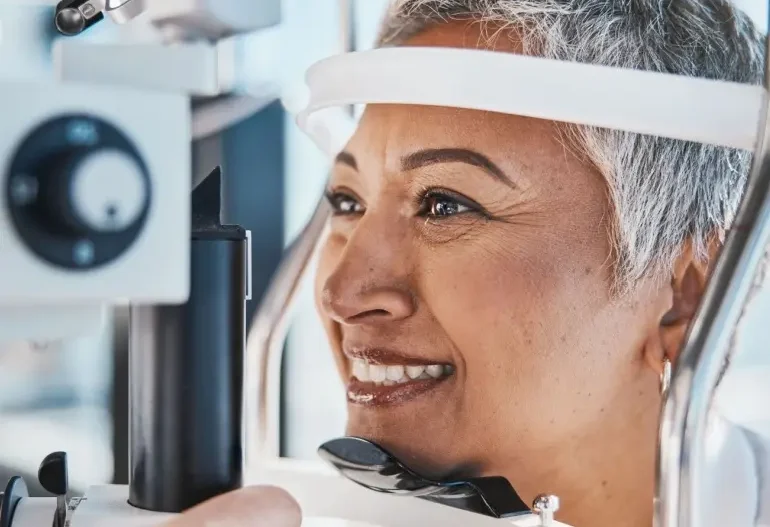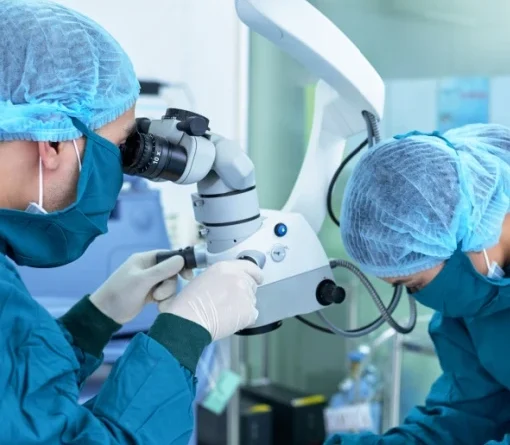
Cataract Surgery
Our highly experienced cataract surgeons provide customized surgery to correct blurry and distorted vision caused by cataracts. We offer a range of intraocular lens options (IOLs), including advanced lenses that allow many patients to achieve vision that is greatly improved to reduce or even eliminate the need for glasses after cataract surgery.
Cataract Surgery in Columbus, Ohio
If you are struggling with impaired vision due to cataracts, you are not alone—cataracts affect more than 24 million people in the U.S., and the number of cases increases each
Trusted Source
Cataract Data and Statistics
National Eye Institute
Go to Source
year.
At Columbus Ophthalmology Associates, our eye care experts combine advanced technology and personalized care to restore clear vision and help our patients get back to doing what they love. Click here to learn more about cataracts, including how cataracts develop, common symptoms of cataracts and how cataracts are diagnosed.

Is It Time For Cataract Surgery?
Cataracts often develop slowly, but surgery to remove the clouded lens is the only effective treatment once cataracts begin to impair vision. You may be a candidate for cataract surgery if you:
- Struggle with less-than-perfect vision even after updating your prescription for glasses or contacts
- Have increasing difficulty with night vision
- Notice that colors seem to look duller
- Have blurry vision that is affecting your ability to perform your job
If cataract symptoms are interfering with your day-to-day tasks or hobbies, it may be time to talk to your eye doctor about cataract surgery.
How Cataract Surgery Works
Cataract surgery involves removing the eye’s clouded lens and replacing it with a specialized plastic lens called an intraocular lens or IOL. The procedure is performed on one eye at a time, so you can expect to have separate surgery dates for each eye usually two weeks apart.

Preparing for Cataract Surgery
A consultation with an ophthalmologist at Columbus Ophthalmology Associates is the first step toward better vision. An exam will determine if cataract surgery is right for you. This appointment is your opportunity to learn about your IOL options and ask any questions.
Your eye care team will give you instructions for the days leading up to surgery, which may include using eye drops. You will also need to arrange for a friend or family member to drive you to and from the surgery.

What to Expect The Day of Cataract Surgery
Once you arrive for your procedure, we will use a local anesthetic to numb your eye. You will also have the option of receiving a gentle sedative to help you relax before surgery. Cataract removal surgery typically takes less than 20 minutes, but you should plan to spend several hours at the surgery center.
To begin the procedure, your cataract surgeon will make a small incision at the front of the eye. The clouded lens will then be removed and your surgeon will replace it with your IOL. In most cases sutures are not needed and a protective shield will be taped over your eye. After surgery you’ll spend some time in our recovery area before going home.

Recovery After Cataract Surgery
While you continue your recovery at home, you should keep the protective shield on for the first few hours and place it over your eye when you are sleeping for the first few nights after surgery. You will be instructed to apply prescription eye drops to prevent infection and reduce inflammation. You may feel mild pain or itchiness in the first few days after surgery, but it is important that you do not rub or touch your eye. Contact us if you have any questions or need recommendations for over-the-counter pain medication.
Patients typically resume most regular activities, including driving, within 2 days after surgery. For two weeks after surgery you should refrain from strenuous activities, swimming, and any activities that could cause dust or debris to enter the eye. In addition, you should not use any eye makeup during those two weeks.


Cataract Surgery Results
You may experience some blurriness or distortion in the days after surgery, but the vision will improve as your eye heals. Some patients notice better vision right away and your final result will depend on the IOL that you choose.

Benefits and Risks of Cataract Surgery
Patients often remark that they did not realize how impaired their vision had become until they experience the vastly improved colors and clear vision after cataract surgery. Benefits of cataract surgery include sharper vision, improved night vision, brighter color vision, and the ability to perform regular tasks with greater ease.
While any surgical procedure carries some risk of side effects or complications, cataract surgery is among the most commonly performed surgeries and is widely regarded as safe. Rare complications include infection, pain, swelling, retinal detachment, or vision
Trusted Source
Cataract Surgery
American Academy of Ophthalmology
Go to Source
loss.
Frequently Asked Questions About Cataract Surgery
Is cataract surgery covered by insurance?
In most cases, cataract surgery is covered by insurance, including Medicare. Premium IOLs, which offer advanced vision correction to treat conditions such as astigmatism, will often involve an additional out-of-pocket cost. However, these specialized lenses can lessen the need for glasses after surgery and allow a more extended range of vision from far to near.
Does cataract surgery hurt?
You may feel some pressure while your lens is replaced, but your eyes will be numbed to ensure you do not feel any pain during cataract surgery. Some patients experience mild discomfort in the days after surgery, but this is temporary and can be mitigated with pain relief medication. A clean washcloth can be run under warm water and placed over the closed lid to help with discomfort and help clear any mucous that may form after surgery.
Can cataracts grow back?
No, but occasionally patients may experience a condition called posterior capsular opacification (PCO), otherwise known as a secondary cataract. This is actually a side effect that can occur in the months or years after cataract surgery. It is easily treated with an in office laser procedure.
Convenient Locations in and around Columbus
We Look Forward to Seeing You!

5155 Bradenton Avenue
Dublin OH, 43017

5965 E Broad St #480
Columbus OH, 43213

4176 Kelnor Drive
Grove City OH, 43123
Contact Columbus Ophthalmology Associates
Ready to rediscover the world with clear vision? Don’t let cataracts hold you back any longer. Contact Columbus Opthalmology Associates today to schedule your consultation and take the first step toward brighter, clearer days.
1 National Eye Institute. Cataract Data and Statistics. Available: https://www.nei.nih.gov/learn-about-eye-health/resources-for-health-educators/eye-health-data-and-statistics/cataract-data-and-statistics Accessed February 10, 2020
2 American Academy of Ophthalmology. Cataract Surgery. Available: https://www.aao.org/eye-health/diseases/what-is-cataract-surgery. Accessed February 10, 2020.
The doctors at Columbus Ophthalmology Associates have either authored or reviewed the content on this site.






